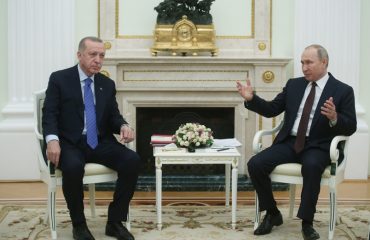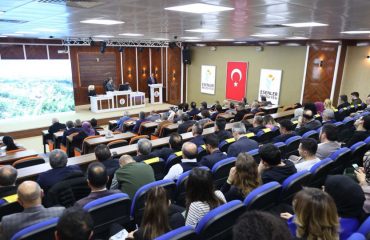

Greek and Turkish Cyprus leaders, Nikos Christodoulides (L) and Ersin Tatar are joking in this file photo by Cyprus Mail.
On March 17 and 18, Geneva will host an international gathering again that promises all the grandeur of a high-stakes negotiation but none of the actual progress. The so-called “informal” Cyprus talks will bring together Greek and Turkish Cypriot leaders, along with the three guarantor powers—Greece, Türkiye, and the United Kingdom—under the watchful eye of United Nations Secretary-General Antonio Guterres. As the European Union has not been officially invited, it will undoubtedly try to influence the process from behind the scenes.
With a carefully crafted schedule that ensures minimal engagement and maximum photo opportunities, these talks are expected to achieve what every previous round of Cyprus negotiations has accomplished—absolutely nothing. But at the very least, they will provide the international diplomatic community with another opportunity to pretend that progress is being made, all while enjoying Geneva’s five-star hospitality.
A two-day spectacle
The structure of these talks is designed not for success, but for efficiency. Day one will consist of what can best be described as “proxy talks.” The UN Secretary-General will meet separately with each delegation, allowing them to air their grievances privately, while refraining from confrontations in public. This process, in theory, is meant to gauge where each party stands before actual discussions begin. In practice, however, it is simply an exercise in diplomatic formality, that allows each side to reaffirm their pre-established positions without the inconvenience of having actual negotiations.
Day two will be the main event—a “five-plus-one” conference, where the five involved parties (Greek Cypriots, Turkish Cypriots, Türkiye, Greece, and the UK) will be joined by the UN Secretary-General, effectively making it a six-party affair. The meeting, however, is scheduled to end by early afternoon; a clear indication that no one expects much to be accomplished.
By structuring the talks this way, the UN has ensured that the event is long enough to appear serious, but short enough to avoid any meaningful confrontations. The Greek Cypriots will push for formal negotiations on a federal solution, the Turkish Cypriots will demand an acknowledgment that no basis exists for a federal model, and the guarantor powers will go through the motions of expressing their respective concerns—all within a tightly controlled schedule designed to avoid any real breakthroughs.
A holiday disguised as diplomacy
For Greek Cypriots, this meeting is a golden opportunity to maintain the illusion that negotiations are ongoing. They hope that the informal talks will serve as a stepping stone toward new formal negotiations under a federal model—one that, in their interpretation, would see Turkish Cypriots absorbed into a majoritarian Greek-run state with some symbolic concessions.
For Turkish Cypriots, on the other hand, the talks are an opportunity to end the charade of a federal solution once and for all. Their goal is to secure a formal declaration that there is no longer a basis for UN-led federal talks, and instead, shift the discussion toward a two-state solution or, at the very least, a Cyprus confederation.
And then there is a third scenario—one that remains a distant but intriguing possibility. If Greek Cypriots finally agree to the 3-Ds—ending the international isolation and deprivation of Turkish Cypriots and accepting their free movement, trade, and contact with the world without preconditions—it could pave the way for talks, but not for a federal Cyprus; this time, for a two-state Cyprus confederation. However, given the Greek Cypriots’ long-standing resistance to any recognition of Turkish Cypriot sovereignty, this remains more of a theoretical exercise than a real possibility.
The Guarantors: A reluctant trio
The presence of Greece, Türkiye, and the United Kingdom as “guarantor powers” is a requirement of the 1960 Treaty of Guarantee, which was originally designed to protect Cyprus’ independence and ensure that neither community dominated the other. However, history has shown that the guarantor system has been repeatedly undermined—often by those who claim to uphold it.
• Greece, despite signing the agreement, violated it almost immediately by stationing over 20,000 troops on the island in the 1960s in direct support of extremist elements seeking union with Greece (Enosis). The Greek-backed coup in 1974 was merely the culmination of a decade-long strategy to Hellenize the island forcibly.
• Türkiye was left with little choice but to intervene in 1974 when the Greek Cypriots, having already removed Turkish Cypriots from the government in 1963, attempted to eliminate their presence. Türkiye’s actions ensured the survival of Turkish Cypriots at a time when they were being pushed into ghettos and denied fundamental rights.
• The United Kingdom continues to hold two military bases on the island, yet plays the role of a disinterested observer. As long as its strategic interests are protected, Britain’s engagement in the talks will remain largely symbolic.
A predictable conclusion
Since these talks are designed more as a public relations exercise than a serious negotiation effort, we can predict the outcome with near certainty:
• On Day One, Secretary-General Guterres will meet separately with each party. Delegates will repeat their usual demands, complain about the intransigence of the other side, and emphasize their “commitment” to a solution. The meetings will conclude without a single inch of movement on any core issue.
• On Day Two, the five-plus-one conference will convene, allowing each side to make official statements. The Greek Cypriots will demand federal negotiations. The Turkish Cypriots will insist on sovereign equality. Türkiye and Greece will exchange thinly veiled accusations, and the UK will sit silently, waiting for the meeting to end.
• By early afternoon, the conference will wrap up, and a carefully worded UN statement will be released. It will likely include vague phrases such as “constructive discussions were held,” and “all parties remain committed to peace.” The reality, of course, will be that nothing of substance was achieved.
After two days of diplomatic theater, the delegates will board their flights home, leaving Cyprus exactly as it was before—divided, dysfunctional, and locked in an endless cycle of futile negotiations.
Cyprus: why Bother?
If the Cyprus talks in Geneva had any real chance of success, they would have been structured differently. Instead, the rushed two-day format signals that even the organizers know that the talks are mere formality. The UN needs to appear engaged, Greek Cypriots need to appear cooperative, Turkish Cypriots need to reinforce their position, and the guarantor powers need to show up and nod at appropriate moments.
But make no mistake—this is not a negotiation. It is a choreographed exercise in diplomatic redundancy, a Swiss vacation disguised as peace talks. And when it inevitably fails, the world will not be surprised. After all, this is how it was always meant to be.


